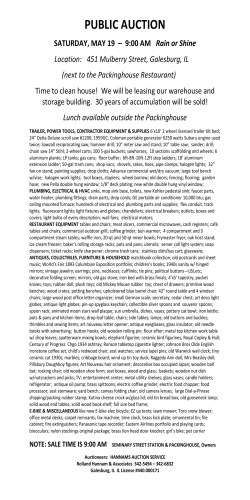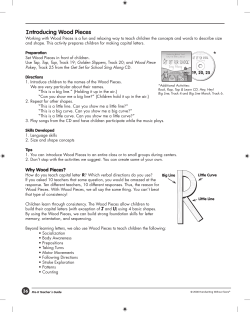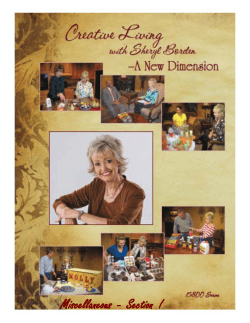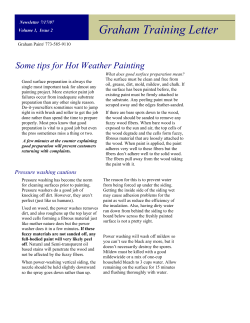
Document 76960
INTERVIEW P.D. James and the Mystery of Iniquity Ralph C. Wood READERS OF MYSTERY NOVELS know that P.D. James is the reigning British Queen of Crime, a worthy successor to Agatha Christie and Dorothy L. Sayers. She is indeed the master of all the English crime novel conventions: a cozy bourgeois atmosphere (preferably a professional enclave), this complacent world horribly disrupted by a murder, the naming of internal as well as external suspects, a further set of complicating murders, the sorting out of various alibis, the inevitable false leads, and the ultimate solution by her detective hero, Adam Dalgliesh. The criminal is finally caught and punished, and moral order is restored, even though much good has been destroyed in the process. What many readers do not know, however, is that James is a writer whose work is imbued with deep Christian convictions. Her novels are concerned to detect not merely who "done" it but also why. She probes human motives with an unusually keen eye for the mystery of iniquity. James's criminals are never evil through and through. Among the strange RALPH C. WOOD is University Professor of Theology and Literature at Baylor University. He received his doctorate in theology and literature from the University of Chicago and is the author of The Comedy of Redemption (University of Notre Dame). anomalies of sin that they reveal, perhaps the chief is this: they often kill in the name of good. James's novels do not offer pleasing literary escapes into unreality. They wrestle, on the contrary, with the very largest moral and social questions: abortion, euthanasia, environmental destruction, terrorism, multiculturalism, homosexuality, etc. A spry octogenarian who has been writing for more than forty years, James has fourteen novels to her credit. Among her best known works are A Taste for Death (1986), Innocent Blood (1980), Devices andDesires (1987), Original Sin (1994), The Children of Men (1992), A Certain Justice (1997), and Death in Holy Orders (2001). She has also written Time to Be in Earnest: Fragments of an Autobiography (1999). That James fleshes out her characters with complex motives and particular features, that she renders the atmosphere and setting of her novels in convincing detail, and that she writes with extraordinary eloquence—these qualities have won her much high acclaim and many literary prizes. In recognition of her achievements, she has been created Baroness James of Holland Park. Wood, together with his wife Suzanne, interviewed Lady James on August 7,2000, during lunch in the Royal Park Hotel overlooking the Round Pond in Kensington Gardens, London. Fall2002 350 LICENSED TO UNZ.ORG ELECTRONIC REPRODUCTION PROHIBITED WOOD: Your novels all deal with the crime of crimes: the taking of human life. And so I'm interested in what you think of the death penalty. You probably know that the United States is the only major nation, perhaps other than Japan, that has retained this ultimate sanction, and that Texas is notorious for exercising it. We execute, I suppose, some 30 or 40 people per year. From reading your novels—where no one is completely a culprit—I would assume that you would be opposed to it. JAMES: Oh yes, yes. I do oppose it. I've always opposed it. I don't think my attitude to it is entirely logical because, unlike most people who oppose it, I do think it does in fact deter. I suppose I think so because it would certainly deter me. And I think it used to deter professional criminals with guns. In a way, that's illogical because I'm saying that I'm willing for other people to be at a greater risk of being murdered in order that I can have a clear conscience about not having a death penalty. But I still have an abhorrence to it. I don't think that here in England we make many mistakes. I think maybe you do because you have such an odd system. It seems to me certain people don't perhaps get the defense that they should get. WOOD: Well, now with DNA testing, there may be even greater proof of guilt or innocence. Even so, there could still be mistakes. JAMES: I won't say we haven't executed people who are innocent; undoubtedly we have. I can take these strongly liberal views about such things, of course, without having to look after very dangerous murderers in prison. WOOD: Your fiction implies, does it not, that we're all such guilty sinners that, were any of us to get justice, it would be a grim world indeed? Your last novel, A Certain Justice, complicates matters even further. There you showed, did you not, that even the murderously guilty do not always get justice and that we have to find ways to live with this unhappy fact. JAMES: I did. It was what Portia said, wasn't it, in The Merchant of Venice: In the course of justice, none of us Should see salvation. We do pray for mercy, And that same prayer doth teach us all to render The deeds of mercy. Portia's speech also relates to one of your other questions. There are certain people in life, though not too many, who are evil in a rather special sense. WOOD: Those who take delight in the sheer thrill of murder, as in A Taste for Death. The murderer there is not seeking, as in so many of your novels, to vindicate someone who has been wronged or else to seek his own revenge for hurts he has suffered. He simply delights in the terror flashing through the eyes of the person he is about to murder. JAMES: But in that book it is the murderer who discovers that the little boy is ill, isn't it? The murderer, in that way, saves the child's life. WOOD: Pornography is an increasing problem in our country, and it seems to be an evil indulged almost for its own sake. It's not primarily a perversion of something good which, by the classical Augustinian definition, evil usually is. Vandalism is another example. You may remember the famous pear-stealing episode in St. Augustine's Confessions. The young Augustine and some of his buddies strip this tree, not to enjoy its luscious fruit, but literally for the thrill of it. Modern Age 351 LICENSED TO UNZ.ORG ELECTRONIC REPRODUCTION PROHIBITED JAMES: We see this too. It's almost as if anything that's beautiful has to be destroyed, for the sheer pleasure of destruction. phemy. Huge! We had terrible trouble. It was the first time someone on the radio had impersonated Christ, and it caused a huge furor. WOOD: The vandalism of cemeteries is something that frightens me. What is to be made of people who go out and desecrate a grave? WOOD: I have discovered that the Dorothy L. Sayers Society is very grateful to you for the support you've given them over the years. In fact, at the Sayers Study Centre in Witham, I found a copy of an address you had given to the Sayers Society 21 years ago. JAMES: Well, some kind of terrible and horrible thrill. I think there are differences when we talk about wrongdoing. There's everything from just not obeying the law, which is one kind of wrongdoing, to not doing what we know we should do, to taking a positive and active pleasure in evil. I'm afraid this last may be getting more common. It seems to me it is. WOOD: On a happier subject: Two of my students have done master's theses on the work of Dorothy L. Sayers. One of them discovered that, in a production last summer, you played the role of Evangelist in three of her plays, is that right? JAMES: Oh yes, the part was supposed to be shared with Lord [Michael] Ramsey [the late Archbishop of Canterbury] but he was too ill, so I had to do all of it. WOOD: Tell us about that. JAMES: It was a very interesting production. WOOD: Where was it done? In a church? JAMES: It was performed in a city church and promoted by the Dorothy L. Sayers Society. We didn't do the whole cycle, just a selection. There were a few professional actors but most of the cast were amateurs. It held up remarkably well. I can remember the huge sensation caused at the time The Man Bom to Be King was first broadcast. Great accusations of blas- JAMES: On Monday, I am unveiling a plaque to her on the flat where she lived in London. We have a system here by which blue plaques are put on houses where famous people lived. I'm unveiling it on Monday. WOOD: If we might talk about your novels for a while: I have surmised that you deliberately portray your chief detective, Adam Dalgliesh, as a skeptic rather than a churchman, perhaps to guard against making him your mouthpiece. Is that a false surmise? JAMES: Yes. One's central character always contains a little of oneself, whether it's a man or woman. When I'm asked why I didn't make Dalgliesh a Christian, I can only retort: "Because he isn't one. He is a reverent agnostic." Having had a father who was an Anglican priest, he has been steeped in Anglican theology. It's interesting for me to have a detective like that when you get a situation such as occurs in A Certain Justice. There the priest has information which was given him in confession and which he will not divulge. Dalgliesh doesn't really waste any time attempting to get him to divulge it. He understands that the priest can't and won't. But because Kate Miskin [his fellow detective] has had no religious education, she thinks the priest's totally and absolutely unreasonable. "We're trying to solve a murder," she says, "and here's Fall2002 352 LICENSED TO UNZ.ORG ELECTRONIC REPRODUCTION PROHIBITED a man who has evidence and won't give it." Dalgliesh understands why he won't. I find it more interesting to have Dalgliesh as he is. WOOD: What about the two novels in which Dalgliesh doesn't appear, Innocent Blood and The Children of Men? Am 1 wrong to think that, unlike your detective novels, these two are virtual thesis novels because they have a moral and theological argument that drives them? Is that too strong? JAMES: No, I think it isn't. I'm not sure how far I set out with that i ntention. When I began The Children of Men, I didn't set out to write a Christian book. I set out to deal with the idea I had. What would happen to society with the end of the human race? At the end of it, I realized I had written a Christian fable. It was quite a traumatic book to write. Yes, I was quite glad to get back to murder mysteries! WOOD: You mentioned in your autobiography that The Children of Men has not been one of your better sellers. I'm disappointed to know that it has not sold as well as some of the others. JAMES: Nor did the autobiography. What people really want from me is a classical detective story. But I'm very lucky: I've always written, always, what I wanted to write. Always. By carrying on with my ordinary jobs, I ensured that I was never in a position where I had to write the next book for money. Some people do their best work like that. I know we're all different, but I couldn't. WOOD: I like the oblique approach that you take in your "fragment of an autobiography," as you call it, rather than giving us another one of those dreary tellall confessions so popular in our time. There's something refreshing, it seems to me, about using the events of an entire year's social calendar to reflect upon your past life. JAMES: It wasn't a complete diary or a complete memoir. But I needed to do it, I needed to say these things. A lot of people felt it was too reserved. But then I'm not a confessional writer, except insofar as any novelist is a confessional writer. You can't prevent yourself from being so. I seem never to write a book which doesn't have a practicing Christian in it. WOOD: You mentioned in your autobiography that there was a time when your father stopped going to church. I wonder whether he might be a distant model for Dalgliesh. JAMES: No. Not at all. I don't think Dalgliesh had a model. I think he represents what I admire in human beings. He has the qualities that I think are important. I have great admiration for and great faith in high intelligence. Dalgliesh is also sensitive, and he is compassionate without any sentimentality, which I hate. And he's reserved, and he's a poet. WOOD: And he's named after one of your English teachers. JAMES: My English teacher. Of course, she was Scottish because it's a Scottish name. I didn't at that time quite appreciate what a Scottish name it is. Yet he's not in the least bit Scottish. WOOD: In Innocent Blood, the sociologist Maurice Palfrey has a TV show called "Dissent" where, on one particular occasion, he interviews an Anglican bishop. There Palfrey spouts his atheistic denials of Christian belief (if I may quote from my own notes): "the monstrous notion that there is a God who created us in His image, when it is obvious that we have made Him in our own likeness; the pathetic injustice of blaming people for original sin, when 353 Modern Age LICENSED TO UNZ.ORG ELECTRONIC REPRODUCTION PROHIBITED they have no choice in the matter; the laughable contradiction between the Virgin Birth and the idea that sex is so sacred it. must be confined to marriage; and of course the terrible doctrine of Atonement with its barbaric idea that the Son must propitiate His Father's desire for vengeance." After the bishop has remained virtually silent throughout this grilling, the narrator comments: "Poor bishop! He could only win by saying things that he'd be too embarrassed to utter and which neither the BBC nor the viewers— especially the Christians—would in the least wish to hear." Isn't this a devastating indictment of the entire church— that one of its bishops would not answer a vitriolic attack with a clear confession of his own faith, and that his fellow Christians would have been scandalized if he had? JAMES: It's an indictment, really. WOOD: When I first read the following passage, I thought 1 had detected a similar kind of indictment. But now, after reading your autobiography, 1 wonder whether there might be a good deal of sympathy in this description of the bishop's own Anglicanism as "a satisfying compromise between reason and myth, j ustif ied by the beauty of its liturgy, a celebration of Englishness; but essentially it was the religion of liberal humanism laced with a ritual to suit each individual taste." That sounded rather close to what I read in your autobiography. JAMES: I think that's very true for a certain kind of Anglican. It's the kind I am most familiar with. Of course the growing part of the church is charismatic and evangelical. But I find that kind of Anglicanism very difficult, a matter of temperament, I suppose. For me, organized religion, the church, is the body within which I can continue my personal search for reality. I wouldn't say my personal search for God because I'm so convinced of His existence and of His love that I don't doubt them. Much else has been puzzling to me, including evil and suffering. But the church remains the framework for my search. Had I been born a Roman Catholic, I would still be a Roman Catholic. I wouldn't necessarily believe in the dogma, but I would see no reason for throwing it over. For I would feel that, by tradition, this is how I must run my race. I think that so many of my friends, like me, were brought up in Anglicanism. They love the beauty of the liturgy, though now, alas, it's being increasingly lost, the order and dignity of it. Yet my friends are not going to bail out, even if our bishops sometimes deny the central dogmas. WOOD: In America we have our own denier of central dogmas, a notorious retired Episcopal bishop named John Shelby Spong. Another retired bishop has recently said of him, "Bishop Spong cannot repeat the Apostle's Creed without perjuring himself." JAMES: I think these things are really interesting. For example, how much of the Creed do we accept literally? Let's take " He came down from heaven." We don't any longer believe that it's up there, do we? To me, heaven is a dimension. It isn't up or down anywhere. At least I can't conceive it is. So, I thought: What do the bishops say? They don't say very much, except to exhort us to live better lives, which is very useful, no doubt. And they don't do that often enough. But I feel very strongly that when we are exhorted by politicians to behave in a certain way, we take no notice of it and rather despise them. That's not their job. But it amazes me that the Archbishop of Canterbury and other bishops don't speak up much more firmly about matters of faith, because it's expected of them. And they would get is more respect if they did. The church is very weak, and when it does Fall2002 354 LICENSED TO UNZ.ORG ELECTRONIC REPRODUCTION PROHIBITED speak out, it's always somehow quasipolitical. Should you take that action or the other? Is the government right in cutting down this or that? What the bishops should really be saying is that we should be looking at ourselves and our own sinfulness. If we were not sinful and selfish, all of us, the social wrongs would be righted. WOOD: At the last major Anglican gathering in 1999, Bishop Spong was terribly offended by the African bishops who called the church to its senses by making very clear, traditional declarations about homosexuality. Bishop Spong wound up virtually calling them primates in the biological rather than the ecclesial sense! Wags in the States thus began to speak of Spong as "culturally challenged." JAMES: I had a friend who was there. He said they practically came to blows. An African flew at Spong. He was culturally challenged almost irreversibly! The serious thing to me is that in Africa they see homosexuality as a great sin. These bishops have members of their congregation who have been martyred rather than become homosexual lovers of local chiefs. When you've seen your fellow Christians martyred for that belief, then you get a bit disconcerted when at the annual conference you hear Canadian, American, or English bishops saying we should ordain these people. There can't possibly be a meeting of minds on this matter, can there? Can't possibly be. WOOD: I have heard that there are now more Anglicans in Africa than in England. JAMES: I can well believe that. It's getting to be a minority religion here. WOOD: What about the future of the church in this country? JAMES: Well, I can get depressed about it. Yet there may be a renascence. If so, I think it will have to face what to me is the fundamental difficulty, and one of the characters in my new book says it: People have a belief in God and a great need for God and a need for prayer and a need for God's power, but I don't think they believe the theology of Christianity any more. I honestly think they don't. They don't really accept the theology of the Redemption. They don't really see that God would send his Son to the world, to suffer this terrible death and be tortured to death in order to redeem us. I don't think they believe in the Virgin Birth. If they are told to go to the Bible, they see very conflicting reports in the Gospels. And they have so much now that enables them to forget about death or sorrow or sin or the great problems. Our ancestors sat in these dark little churches, and their lives were "brutal, nasty, and short" and full of pain. You had to do something about wrongdoers, and you had the comforting feeling that they would go to hell. And they believed they would. And if you were good you went to heaven. Now you see what people fill their lives with. Honestly, football is the national-international religion now. And it has all the marks. It's got its heroes, it's got its high priests, it's got its martyrs, it's got its rituals, it's got its theology. WOOD: 1 see mere kids buying £40 [$60] T-shirts celebrating Manchester's winning football [i.e., soccer] team. JAMES: Exactly. And then there's shopping and do-it-yourself, and holidays and stores and pop music. So they're able to stamp out these deep questions. But when aterrible disaster happens, it's very often to the church that they look. The social workers come to counsel, but people recognize that something else is needed. WOOD: Or they collapse into the kind of sentimentalism that followed Princess Modern Age 355 LICENSED TO UNZ.ORG ELECTRONIC REPRODUCTION PROHIBITED Diana's death and that you decried in your autobiography. JAMES: Absolutely. WOOD: The tons of flowers were placed right here in Kensington Gardens [which our restaurant overlooked], weren't they? JAMES: There were flowers all around. The interesting thing is that it wasn't a great field of flowers but a field of plastic and tissue paper. They were never even undone; it was all papers, a field of plastic. She was not, how do you say, a lady whom I admired, although I was sorry for her. I think that Prince Charles should never have married her. A disastrous match. To that extent he was at fault. But I am quite sure that, when he did marry her, he intended to be faithful and that he did his best. WOOD: When we lived here in 1987-88, it was evident that their marriage had already begun to be an affair of separate lives. We'd see pictures of her attending rock concerts and sitting among the screaming crowds as if she belonged there. She struck me as a nice but rather empty girl, but maybe that's too harsh. JAMES: Yes,shewasaverydisturbed young woman. I think partly because she was so harmed in childhood: her mother walking out on her, and the very acrimonious divorce that followed. That harmed them all so much. She was totally without any education. WOOD: We've read that Prince Charles has declared that he and Camilla Parker Bowles will not marry. Is this because the nation would not have her as a prospective queen? JAMES: I think it may well be. WOOD: We joke that Prince Charles will probably be a nursing home resident when he finally becomes king. JAMES: He very likely may be, they have such a long-lived family. WOOD: What do you make of my suggestion that liberalism of the classic kind has a certain canker at its core—namely, an unwillingness to define the good, an eagerness to give all men the freedom to achieve this undefined freedom in their own way, no matter how outrageous. Is that a fair criticism? JAMES: Yes, I think that is a fair criticism. But of course liberalism doesn't pretend to be religious because it says you can do exactly what you like as long as you don't hurt others. Whereas religion says you can do exactly what you like, as long as you don't harm yourself as well as others or disobey God. It's a different kind of paradigm, isn't it? WOOD: St. Augustine's famous motto, as you know, was "Love God and do what you will." But that's a different kind of doing "exactly what you like." Loving God means that we will put all of our other loves in order, and that this will produce the kind of freedom which puts real constraints on some of our loves. Our contemporary world, by contrast, regards all constraint as a loss of freedom. JAMES: We've bandied these words around and talked a great deal about the necessity of love but, in many of my books, I show how dangerous obsessive love can be. WOOD: Your novels demonstrate that fact ever so powerfully. But where do such theological insights come from? They seem to well up naturally in your novels. Do they have a specific source? Or do they spring from a lifelong existence in the church? Fall2002 556 LICENSED TO UNZ.ORG ELECTRONIC REPRODUCTION PROHIBITED JAMES: I think they must come partly from real infant childhood, from a childhood in which every Sunday 1 went to church. And of course every school day began with an act of worship. I come from a strong Anglican family, so that was bred in me. But I also think that a natural interest in God was planted in me, a natural longing to believe in Him, to feel He was there. It's come from a lifelong experience of praying for help and receiving that help. But as you probably gathered, I do find huge difficulty with much of the dogma. Recently I thought, "I will go back to the Gospels and read them as if I were coming to them fresh and see what I think about this man they portray." And it was interesting because I was led to an immense admiration for him. Not a feeling that I was reading about somebody who was the incarnate Son of God. I felt there were certain things like the destruction of the swine and the cursing of the fig tree that were almost petulant: surely that was not God's behavior! And then, of course, you get the story of the Passion: "Father, forgive them, for they know not what they do." Here you feel, whether he was divine in the sense which the creed suggests he is, here is somebody who should be worshipped and followed. WOOD: C.S.Lewissaidthat.afterspending a lifetime reading Greek and Roman myths about rising and dying gods, he found it impossible to regard the New Testament as a mythic book. It certainly has its mythic elements, but "crucified under Pontius Pilate" is not a mythic claim. JAMES: And the great mystery of the empty tomb which is at the heart of Christianity. How far are any of us entitled to call ourselves Christians if we don't affirm the physical resurrection? WOOD: Speaking of such fundamental religious matters, I notice that your nov- els are larded with quotations from Shakespeare, as we should perhaps expect. But I was happily surprised by the wonderful quotation you lift from Bunyan in Innocent Blood. Would you have read Bunyan as a young child? JAMES: Yes, as a child. WOOD: But it has remained locked in your head so precisely all these years? JAMES: No. It's probably locked there, and then I probably look it up and make sure I have it right. It comes like so many quotations. WOOD: It's from Part II of The Pilgrim's Progress, the usually unread part of Bunyan, and it's a splendid warning against all attempts to bypass the hard and steep road to truth: "Some also have wished that the next way to their father's house were here [in a green meadow filled with lilies], and that they might be troubled no more with either hills or mountains to go over, but the way is the way, and there is an end." JAMES: I know. WOOD: It's marvelous. My wife and I are Baptists, and he's our only great Baptist writer. JAMES: Yours is a much less compromising religion, isn't it? And therefore you have fewer of these problems. WOOD: We have our own problems, of course, when it comes to authority. President Clinton's Baptist pastor in Arkansas, for example, offered no clear declaration that the president's public repentance should have first occurred in the church, nor that his candor about his sin should have drastic consequences, both in the church and in the world. Even we Baptists could use a few bishops who are willing at Modern Age 357 LICENSED TO UNZ.ORG ELECTRONIC REPRODUCTION PROHIBITED times to say No, especially in matters moral and doctrinal! vices consist of a concert followed by a lecture. JAMES: As long as they do! If you had ours, they wouldn't. JAMES: The church I often go to, All Saints MargaretStreet.isavery fine church in which the Creed and the Gloria are often sung in Latin. They have the Angelus, and they have a professional choir. The priest doesn't like it when people ring up and ask what the music is, because that is not what you are supposed to be going to church for. 1 absolutely agree. Of course, I think the Eucharist has to be the heart of the action; and I suppose this is also true in the Baptist church too, that Holy Communion is the heart of the worship? Or is it? WOOD: You may be interested to hear that our daughter and son-in-law have both become Anglicans, Episcopalians as we say, for reasons you will find interesting. They argue that the average evangelical Christian service of worship makes them feel like spectators rather than participants, whereas in Episcopal liturgy, in Anglican liturgy, they are actively engaged and involved from the moment of the procession to the final recession. Of course, our daughter is a very good musician, and she often sings in the choir. But she makes the valid point that Anglican worship engages all five of her senses— and thus her entire bodily existence—in rightly glorifying God. She and her husband are either genuflecting, or making the sign of the cross, or singing the liturgical responses, or listening to the homily, and sometimes they are even smelling the incense! The Anglican service doesn't stand or fall upon the quality of the sermon, as so often happens in many Protestant services. JAMES: Of course the Eucharist is the central service. But you do not have that same degree of participation? WOOD: Our own congregation has monthly communion, which is much more frequently than in many Baptist churches. MRS. WOOD: But our Baptist church does have a liturgy, a very modest one with a processional and a litany. Yet you often have Baptist services where, except for the hymns, there would be no other active participation within the congregation. WOOD: You may have heard the nasty jibe that many Protestant worship ser- WOOD: Honestly, it's not. It's secondary, even at best. The Swiss theologian Karl Barth put our case well when he said that the sermon should be the central Protestant sacrament. It's the point at which, we believe, the Word of God comes to life in a vital and ongoing way. There we encounter the living Christ as He engages us and our world. That's a risky claim, of course, because preachers who discourse on current events or spout their personal opinions destroy the true act of worship. But we can certainly be agreed that the fundamental meaning of the word eucharist is "grace gift," and that in the Redemption wrought by our Lord on His Cross we have received the supreme favor. I would add that this unparalleled Gift enables us to understand the nature of all other good gifts. Perhaps it is not inappropriate to observe, in conclusion, that you have received one of God's good gifts in having just completed your 80th year of life while retaining sprightly health. JAMES: I think I have. I have received a huge blessing. I get the old aches and pains—who doesn't?—though I'm very, very lucky, and I thank God. I think very often that the basis of my religious belief is gratitude. Fall 2002 358 LICENSED TO UNZ.ORG ELECTRONIC REPRODUCTION PROHIBITED
© Copyright 2026



















